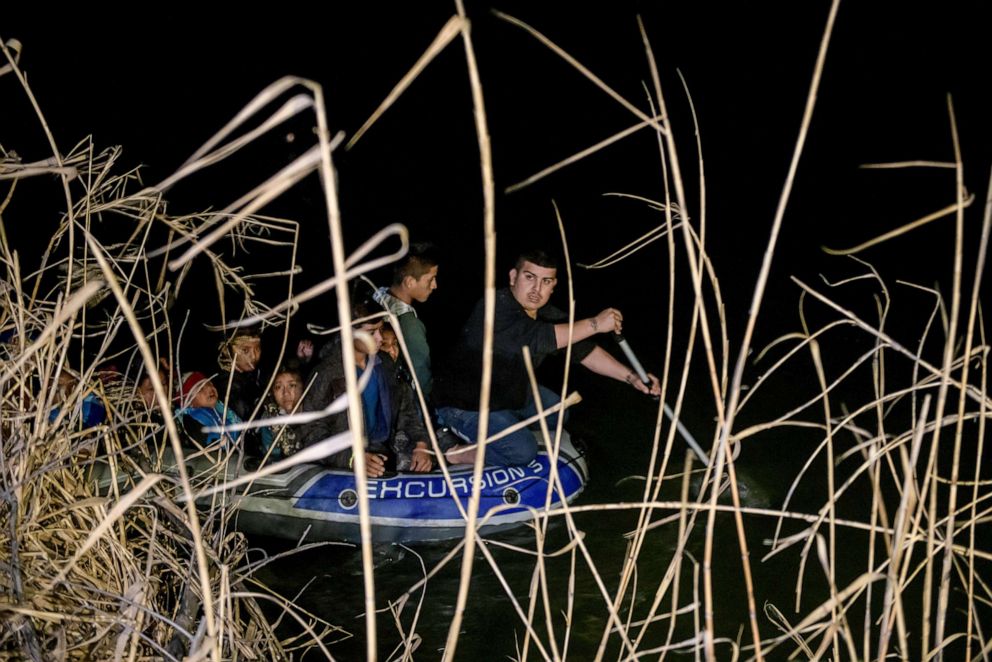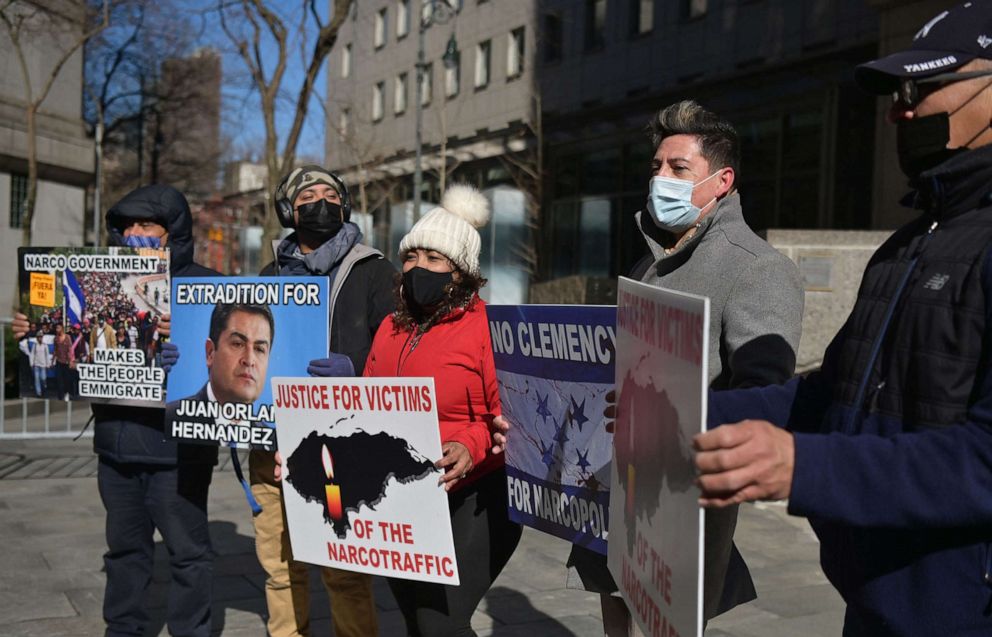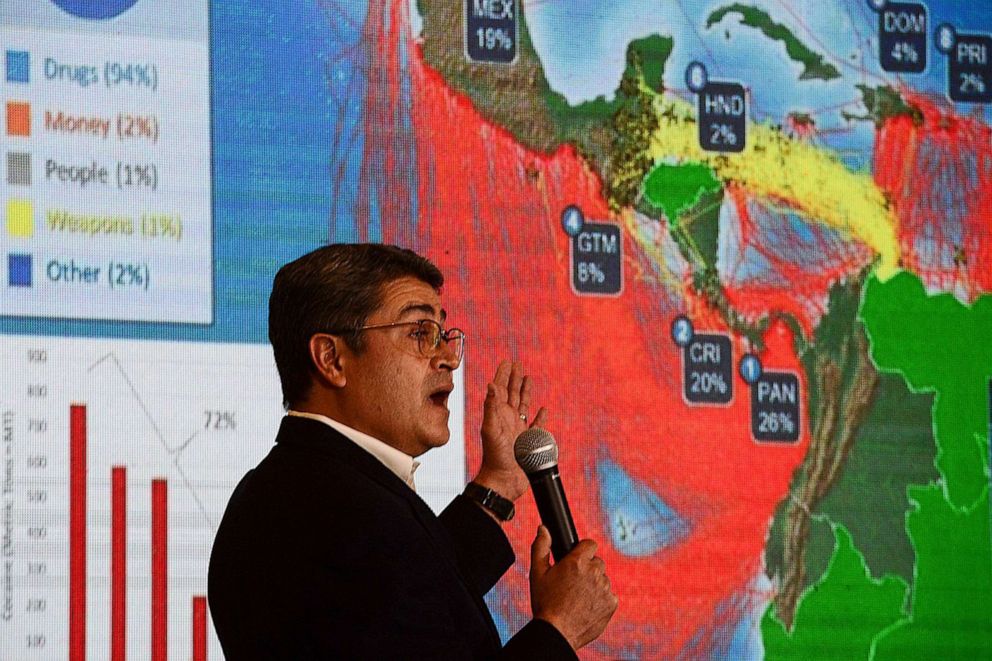Accused of drug trafficking, Honduran president a critical challenge for Biden's immigration plans
President Hernandez has been accused of seeking to flood the U.S. with cocaine.
Vice President Kamala Harris will begin calling leaders from Central America this week as she takes the lead for the Biden administration on tackling a surge in migration to the southern U.S. border.
But one of those calls will be particularly delicate because she'll be talking to a head of state who acts more like a narcotrafficker, U.S. prosecutors in New York have alleged.
President Juan Orlando Hernandez of Honduras has been cast as a co-conspirator in a federal drug trafficking trial this month. His associate, now a convicted drug kingpin, has alleged that Hernandez accepted millions of dollars in bribes and helped protect a flood of cocaine into the U.S.
Hernandez has not been charged and denied the allegations, even distorting State Department data about drug trafficking in his country to claim, "HUGE SUCCESS!"
Many of the migrants reaching the southern U.S. border are fleeing violence, drugs and corruption in Honduras under Hernandez's watch. In light of the allegations against him, there is growing pressure on the Biden administration to change its approach to Hernandez, who claimed victory in a close 2017 re-election race that was marred by allegations of fraud -- but for which he received U.S. backing from the Trump administration.

A State Department spokesperson told ABC News that the Biden administration is dedicated "to fighting corruption in Honduras and we will support and work with leaders who are committed to these same goals." But they would not say whether Hernandez is such a leader, criticize him directly or say if the administration sees him as part of the problem.
Instead, they added their commitment "to work with partner governments who are ready to make the needed political, rule-of-law and economic reforms that are essential to success."
President Joe Biden has pledged a $4 billion, multi-year investment project in Central America's so-called "Northern Triangle" -- Honduras, El Salvador, and Guatemala. The majority of migrants to the U.S. border are from one of these three countries, traversing through their larger neighbor Mexico and fleeing high rates of violence and gang activity, few jobs or opportunities, and much insecurity.
The investment is in its earliest stages and has not yet been appropriated by Congress, but the Biden administration may move quickly with some funding as it faces a record increase of unaccompanied minors crossing the U.S.-Mexican border.
Harris will oversee an effort to not only stem the flow of migrants, according to the White House, but also establish a "strategic partnership" with Mexico and the Northern Triangle "to enhance prosperity, combat corruption and strengthen the rule of law."
Given the allegations against him by U.S. prosecutors, some analysts say it is hard to see how Hernandez can be part of that. He has been repeatedly named in the trial of Honduran drug trafficker Geovanny Fuentes Ramirez this month. U.S. attorneys for the Southern District of New York alleged that he accepted bribes from Fuentes to facilitate tons of cocaine to the U.S. while a presidential candidate and leader of Honduras' congress in 2013.

While appearing to cooperate with the U.S. Drug Enforcement Agency, Hernandez reportedly vowed to tear up Honduras' extradition treaty with the U.S. and "stuff drugs up the gringos' noses," prosecutors said.
In addition to Fuentes, Hernandez's brother Tony Hernandez, also a Honduran congressman, was convicted in October 2019 of drug trafficking charges and lying to the Drug Enforcement Agency. He is scheduled to be sentenced Tuesday for up to life in prison.
While the State Department declined to directly criticize Hernandez, it said none of Biden's $4 billion investment will go directly to governments in the region, including Hernandez's, but to civil society, religious organizations, international organizations and nongovernmental organizations.
"This is not a blank check," the department spokesperson added. "Addressing the region's daunting challenges requires systemic change and political will from the leaders of El Salvador, Guatemala and Honduras. Combating corruption and impunity is at the center of our strategy for the region. Central America will never live up to its full potential without addressing endemic corruption."
But they would not say how they'll do that, especially with Hernandez in power -- except that they have "robust" ways to monitor how funds are spent and they "will use all available tools, including visa restrictions, to promote accountability for corrupt actors."
Whether that extends to a head of government remains to be seen. While U.S. prosecutors have directly implicated Hernandez, charging him would be a highly unusual move to make against a foreign head of government. Venezuela's Nicolas Maduro was charged in March 2020 by the Justice Department for drug trafficking too, but the Trump administration no longer recognized him as Venezuelan president.
Hernandez also said earlier this month that State Department data provides an "instant rebuttal of the false narrative" against him -- tweeting that his "government dramatically lowered the drug rate from 87% to 4%... a reduction of 95.4%"
But that distorts data from the State Department's annual reports on international narcotics control. In 2013, it said that up to "87 percent of all cocaine smuggling flights departing south America first land in Honduras," a key transit point for narcotrafficking because of how remote and ungoverned its north coast is. In the 2020 report, that number drop to 4%, but largely because "more is assessed to have transited through Honduras by land after making a first arrival in other countries."

The State Department declined to comment on Hernandez's claim, but its 2020 narcotics report highlights cooperation with the Honduran government despite the prosecutors' allegations.
"The political will of the Honduran government to combat drug trafficking in coordination with U.S. law enforcement agencies continues," the report said. "The Government of Honduras does not, as a matter of official government policy, encourage or facilitate illicit drug production or distribution, nor is it involved in laundering the proceeds of the sale of illicit drugs."
The problem runs much deeper than Hernandez, too. Yani Rosenthal, the front-runner to be one of the two major party's presidential nominee, was released from U.S. prison in August after serving three years for money laundering, while several other candidates in the country's primaries earlier this month were under investigation for corruption.
Critically, one of the reasons Hernandez remains in power now is because of prior U.S. backing. After removing the country's limit of two presidential terms, Hernandez claimed victory in 2017 in a narrow contest that international election observers from the Organization of American States and the European Union said was fraudulent.
The Trump administration, however, stood by Hernandez in the face of widespread protests and a bloody government response that left dozens dead. The State Department said there were "irregularities identified by the OAS and the EU," but called for "robust national dialogue ... to heal the political divide" and congratulated Hernandez.
Lawmakers back then opposed Trump's support for Hernandez, and this week, a group of Democrats have stepped forward to urge Biden to reconsider the U.S. partnership with Hernandez.
Rep. Norma Torres, a leading U.S. lawmaker on Central American issues and a Guatemalan native, wrote to Biden's team this week to stop "sending money to directly to the hands of corrupt officials" like Hernandez. Last month, Sen. Jeff Merkley, D-Ore., introduced a bill to impose sanctions on Hernandez and suspend U.S. security assistance and export licenses for certain defense-related items to the country.
ABC News' Ben Gittleson contributed to this report from the White House.




